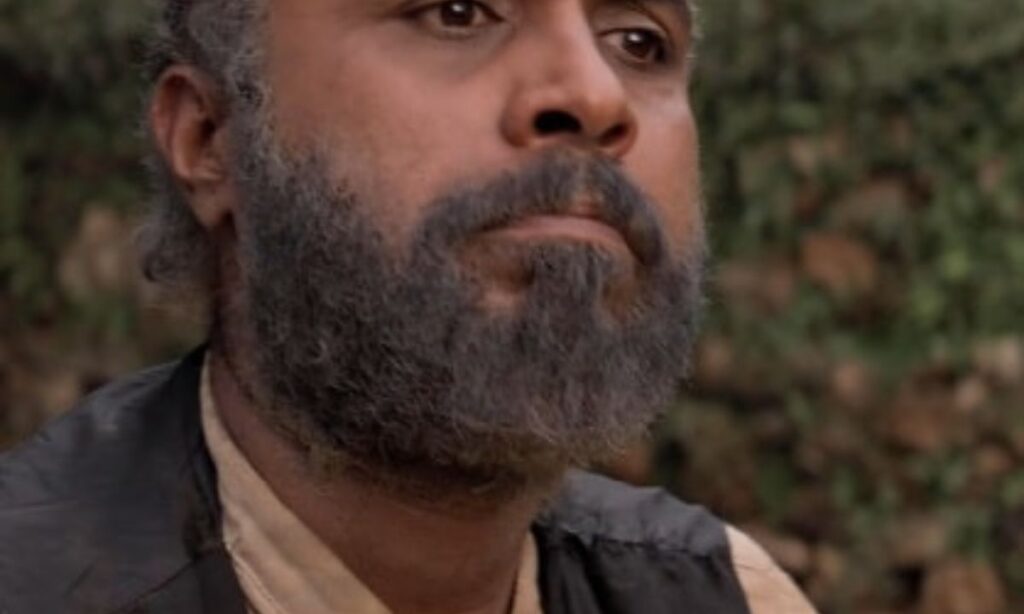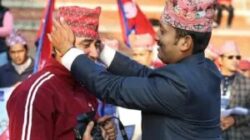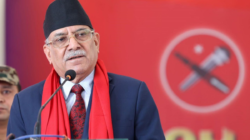
Bijay Baral is the superstar of the moment. His first film as a lead actor, Purnabahadurko Sarangi, achieved a remarkable milestone by grossing over 200 million at the domestic box office. Transitioning from theater to films, Bijay has won the hearts of audiences with his natural and exceptional acting skills.
Be it the character of B.K. in the Kabaddi series or Purnabahadur Gandharva in Purnabahadurko Sarangi, both have become iconic roles in Nepali cinema, brought to life with depth and soul by Bijay. On this trajectory of success, Bijay Baral engaged in a candid conversation with Onlinekhabar journalist Bishnu Sharma.
How many times have you watched your film?
I watched it twice on the first day itself—once in the morning and again in the evening with my wife.
How has the feedback been so far?
The feedback has been overwhelmingly positive. Some friends from the industry mentioned things that could’ve been done differently, but overall, the response has been more appreciation than criticism. This phase feels like a time of immense praise for me.
How does achieving such massive success impact an individual?
In my 17 years of theatrical journey, I had already experimented with various forms of drama. My film career spans 13 years. Such enormous success can disorient people, but I don’t think it will affect me that way. I’ve played many characters before, but this kind of unprecedented surge in recognition hasn’t occurred in my life until now.
Previously, although the films I acted in were successful, I wasn’t the lead character. But now, as the central figure, being recognized and appreciated nationwide and having the film discussed so widely is a big, fulfilling moment for me. Still, I remain grounded and try to maintain balance between success and failure.
How has Bijay Baral changed before and after this success?
The essence of who I am remains the same, but my mindset has shifted slightly. My habits are unchanged, though I now feel like I need to wear a metaphorical mask at times. Before, I believed that acting was for others, a form of showing emotions. Now, I realize I must also internalize this success and responsibly channel the energy that comes with it. The audience’s massive turnout and the widespread discussion about the film have brought a slight transformation.
After success, you do need to acknowledge and embrace it. The key is to figure out how to use this energy effectively. I’m mindful of this and aware of the once-in-a-lifetime emotional vibrations and energy this phase brings.
What is your greatest fear right now?
Honestly, I’m not a person who gets scared easily. But now, receiving ten calls for every call I answer and having a constantly buzzing phone feels overwhelming. People who care for me often tell me, “Bijay, stay grounded. Choose your projects wisely. This is your moment; make the most of it.” That advice does make me anxious at times. However, I’ve always been committed to doing justice to my characters, and that principle remains unwavering. My fear lies in handling my upcoming work well.
After delivering such a blockbuster, will ego creep into Vijay Baral?
To be completely honest—no. If I were only doing films, maybe it could have happened. But I have my roots in theater. After a film, I always return to the stage, where I meet the audience daily and reconnect with my foundation. This routine keeps me grounded and prevents me from developing an inflated ego.
If you were to develop an ego, what kind would it be?
It’s not in my nature to nurture arrogance. Even imagining such a scenario feels like acting. I’d say I’m 95% immune to ego, though I might leave 5% open to it—it’s human nature, after all.
This unprecedented success—what do you think is the reason behind it?
Success doesn’t just happen; it’s the result of preparation. Before this, I had already been laying the groundwork, even though I didn’t expect this level of recognition. Success feels sustainable only when preceded by diligent preparation. Without it, success may not last long.
What have you learned from recent events and this journey?
After Lakshmi Puja, I realized that energy flows with intention. If you keep putting in effort, you’ll eventually achieve something. On Lakshmi Puja, my wife Pramila and I went to a theater, and there were only four viewers, including us. I became emotional but told Pramila, “If the story resonates with people, the film will thrive through word-of-mouth.” Later, the film turned into a phenomenon. It’s like magic—beyond preparation, there’s also an unseen collective energy at play.
Do you have a mantra for making films successful?
My mantra is to make any character I play engaging and relatable to the audience.
What kind of films do you think should be made now?
Looking at the current festive atmosphere, films in the comedy, action, or grassroots genres seem to resonate well with audiences. Nepal has a rich diversity of ethnicities and communities, so our films should tell core, universal stories that connect with the audience emotionally. The success of Purnabahadurko Sarangi shows how a character that touches the audience’s heart can create an impactful cinematic experience.



